Matthew 25:1-13
Pastor James Preus
Trinity Lutheran Church
November 21, 2021
After Jesus ascended into heaven, and Jesus’ disciples were still gazing into the sky where he departed, two angels appeared and said, “Men of Galilee, why do you stand looking into heaven? This Jesus, who was taken up from you into heaven, will come in the same way as you saw him go into heaven.” (Acts 1:11) And from that moment on, the holy Christian Church on earth has been waiting with great anticipation for the return of our Lord Jesus, who will judge the living and the dead. This will be a joyful event. We will love his appearing (2 Tim. 4:8). He comes with redemption (Luke 21:28). He does not come to deal with us according to our sins, but to save those who eagerly wait for him (Hebrews 9:28).
In our parable today, the Bridegroom is Jesus Christ. The ten virgins are the holy Christian Church on earth. They are going out to meet the Bridegroom. This means that they have separated themselves from the unbelieving world. Through their worship, Baptism, services, devotion, and conduct, they have distinguished themselves from the non-Christians as they wait the return of the Bridegroom. Christ, the Bridegroom, has won their salvation with his bitter suffering and death. He has gone to prepare a place for them. The virgins expect him to return at any moment.
But Jesus tells us that half of the virgins are wise and the other half foolish. This tells us that even within the holy Christian Church on earth there are true believers and false hypocrites. There are those who persist until the end, and there are those who grow weary of waiting, grow unprepared, and ultimately are unready for Christ’s return. The wise virgins who made sure they had enough oil for their lamps were let in. The foolish virgins, who brought lamps with no oil were locked out.
All ten virgins fall asleep. This teaches us that no one knows when Jesus will return, not even the true believers. So, all Christians must be ready at all times for Christ’s return. We should live every day as if it is our last day before Christ’s return.
The five wise virgins fell asleep along with the five foolish. Even true Christians get busy with earthly things. Although being a Christian separates us from the unbelieving world, we are not called out of this world yet. We still have our earthly vocations. We’re fathers and mothers, sons and daughters. We must provide for our families, nurture and raise our children, make sure stomachs are full and bodies clothed. Yet, wise Christians do not place earthly things above Christ and his Word. They do not let their oil run out, even as they sleep. Their sleep is a restless sleep, frequently waking to check their lamps. It is one thing to attend to your earthly duties in this life, while maintaining faith in Christ. It is quite another thing to devote yourself solely to worldly things and to forsake Christ’s Word and run out of faith.
It was wrong even for the wise virgins to fall asleep, but the Lord does not rebuke them for their slumber. He comes with mercy and compassion. He has come to bring them into his wedding hall to celebrate. This is why he has sent his preachers to announce his coming, so that the virgins awake. What was much more important, was that they still had oil. The Lord harshly rebukes the foolish virgins for letting their oil run out, even saying, “I do not know you.”
The lamps are their faith. Faith alone saves, as Scripture clearly teaches (John 3:16; Mark 16:16; Romans 3:23-28; Ephesians 2:8-10; etc.). Yet, not all faith saves. Only that faith which trusts in Jesus Christ, who alone has made satisfaction for our sins. Lamps are no good without oil. They need something to burn. Faith is no good without Jesus Christ and his promise of salvation.
The oil is Christ’s Word and Holy Spirit. It is through Christ’s Word and Sacraments alone that the Holy Spirit works. Faith comes by hearing and hearing through the Word of Christ. Christ alone has won for us salvation. He has done everything. He obeyed the Law perfectly in our stead. He suffered and died for our sins. He rose again from the dead and is seated at God the Father’s right hand, pleading for our innocence by the merits of his own suffering and death for us. And the Father cannot deny his Son. Everything rests on Jesus and on Jesus alone. This is why only faith can save. Faith simply receives the promise. This is why Christ’s Word is the oil. Christ promises us salvation by his own merits. We believe the promise and are saved. This is why the Sacraments are the oil. The Sacraments have their power in Christ’s Word and promise. Baptism saves, because Jesus says it does (Mark 16:16). The Lord’s Supper gives you forgiveness of sins, because Jesus says it does (Matthew 26:26-28). The Absolution spoken by the pastor forgives all your sins before God in heaven, because Jesus promised it does (John 20:23). This is why the Holy Spirit is the oil. The Holy Spirit works through Jesus’ Word and Sacraments. It is the Holy Spirit who creates faith in our hearts and keeps us in the true faith. He does this by means of Christ’s Holy Word.
There are those who claim that the Holy Spirit comes to us apart from Jesus’ Word. They think that they can have faith in Christ without hearing God’s Word preached or receiving Jesus’ Sacraments. They disagree with Jesus. The Holy Spirit only works faith through Christ’s Word. Without God’s Word, faith cannot exist. It dies. This is why our Lutheran Confessions assert in Augsburg Confession Article V, “Our churches condemn the Anabaptists and others who think that through their own preparations and works the Holy Spirit comes to them without the external Word.” Our churches condemn not the persons, but the teaching that the Holy Spirit works without Christ’s Word, because this devilish teaching robs poor sinners of the true Gospel, which saves.
This is why it is so dangerous to skip church and go long periods of time without hearing God’s Word preached or receiving the Sacrament. We cannot by our own reason or strength believe in Jesus Christ our Lord or come to him, but the Holy Spirit calls us by the Gospel. Without the Gospel, the Holy Spirit does not call us or sanctify us. The claim that you don’t have to go to church to be a Christian is a lie Satan has been repeating in the ears of Christians for generations. It’s absurd on its face. I know that this is offensive to many, because this is such a popular phrase, but we have to get to the root of Satan’s lie. What is his goal? His goal is for you to not hear God’s Word! Obviously going to a church building doesn’t make one a Christian, but hearing Jesus’ Word does! You go to church to hear Jesus’ Word. Christians listen to Jesus’ Word. Of course, you need to go to church to be a Christian, that is, you need to hear Jesus’ Word. You need oil for your lamp, otherwise it will burn out. And those who cannot physically come to the church building because of sickness or old age still need to hear God’s Word. That is why pastors visit their sick and elderly members, so that they can replenish their lamps with needed oil. Those who say you don’t need to go to church to be a Christian are saying that you don’t need oil in your lamps. It’s foolishness.
The foolish virgins had lamps with no oil. They looked like Christians, but they did not hold in their faith the saving Gospel. They either got caught up with the cares of this world and neglected to hear God’s preaching and receive the Sacrament for long periods of time, thinking, “Oh, I know it. My faith is still good.”, until their lamps are dry and the flame has gone out. Or, they hear the preaching of God’s Word and receive the Sacrament, but they pay no attention to it. They refuse to learn from it. They don’t take it to heart. They grow lackadaisical toward Jesus’ teaching. They grow bitter toward their fellow Christians and their love for others grows cold. In short, they have no faith in the content of what Christ preaches. They let the oil spill out and don’t put any in their lamps.
It is the oil that gives us confidence that Jesus comes to us with love and mercy. It is the content of our lamps, which gives us confidence that Jesus comes with salvation. St. Paul says in 1 Thessalonians chapter 5 that God has not destined us for wrath, but to obtain mercy through our Lord Jesus Christ, who died for us so that whether we are awake or asleep, we might live with him. This is what the oil is. God’s promise of mercy and love. The Holy Spirit works through the message of God’s love and forgiveness through Christ Jesus. Filling your lamps with oil is only burdensome, if you think that Jesus’ love and forgiveness is burdensome, that your sins are not a pressing issue, that God’s judgment is not something to fear. This oil is given to us freely and liberally. It is the message of Jesus’ work of salvation for you. If Jesus willingly went to the cross to die for your sins, why would he hate you? Why would he desire to return to damn you? The oil tells you that you have a loving God and Savior in Jesus Christ.
The Bridegroom told the foolish virgins, who didn’t bother to fill their flasks with oil, that he did not know them. He did not know them, because they would not know him. They didn’t value the oil. They weren’t comforted by the flame of faith that came from their lamps. They spurned the Gospel of Jesus Christ. They would not listen to Jesus’ teaching, or at least, would not take it to heart. They didn’t trust in Jesus’ promise of forgiveness won by his blood. They looked like Christians. They were members of Christian parishes. They even showed up to church, some of them, quite often. But they spilled out the oil, lest it be stored in their heart and burn brightly in anticipation for the Lord’s coming.
The wise virgins were welcomed into the wedding hall. The Bridegroom knows them. They know the Bridegroom. They delighted in his oil. They were comforted by his promise that he would welcome them; that he had paid all their debts. They were filled with the Holy Spirit.
What I speak to you now is the precious oil, which keeps your lamps burning, so that you are prepared for the return of Christ. Jesus Christ, our God and brother, died for all your sins. He is risen, and reigns with God the Father in heaven. He will return to bring those who trust in him to salvation. The Sacrament of Baptism is the oil. It assures us that our sins are washed away and that we are God’s children now. The Sacrament we prepare our hearts to receive is the oil. It declares that Jesus gave up his body and shed his blood for your forgiveness and salvation. The Holy Spirit himself works through the Word and Sacraments, to open your hearts to this promise. If you trust in this Gospel, you are prepared for the return of Christ, whether he comes by night or day, today or tomorrow. If you trust in this Gospel, you are prepared whether death takes you tonight or fifty years from now.
Jesus tells us to be watchful, for we know neither the day nor the hour. We are watchful when we hear and take to heart the Gospel of Christ. Then our flasks are full of oil. Then our lamps are burning brightly. Then we will arise with joy when our Savior finally appears. Amen.
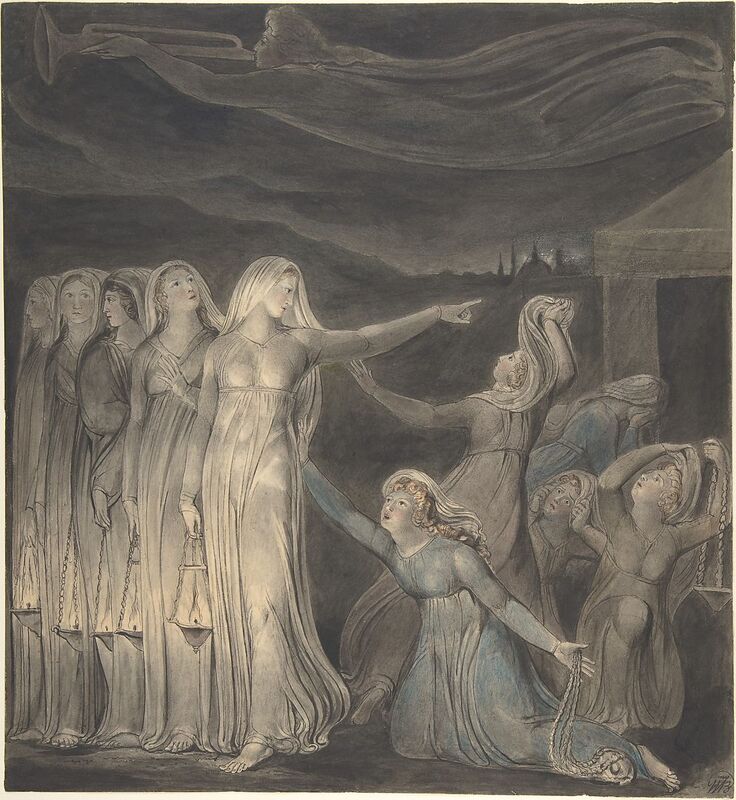
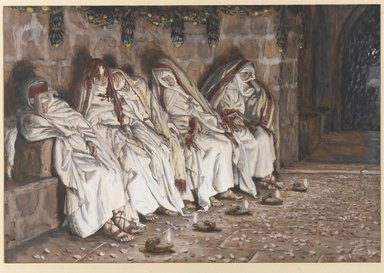
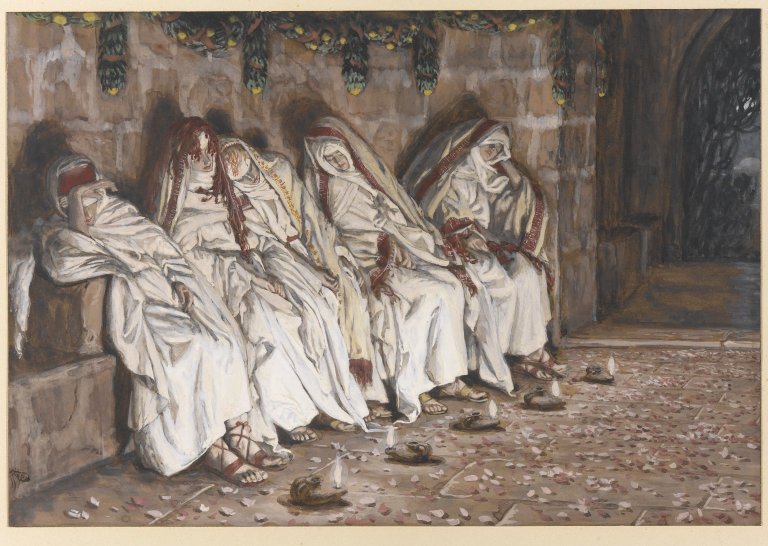
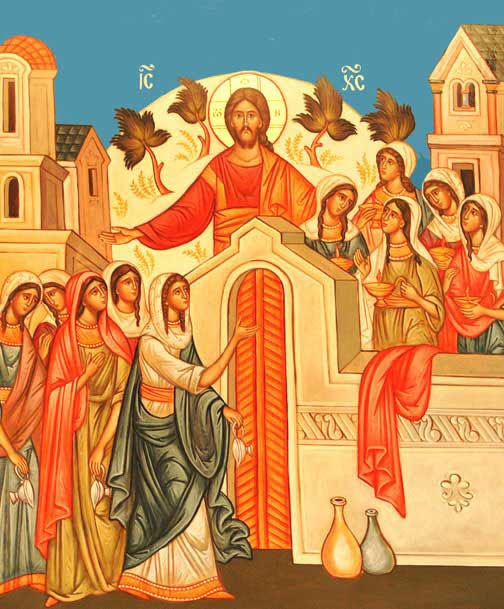
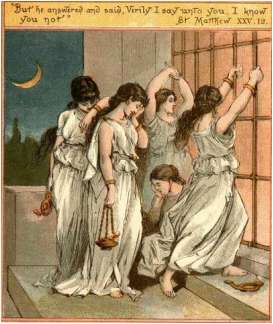
 RSS Feed
RSS Feed